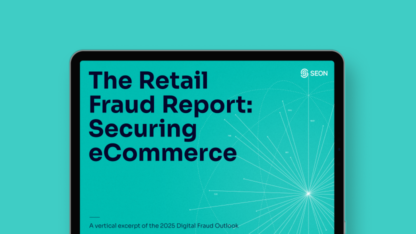Of course, asking customers for their address has multiple advantages. You can confirm who they are, ship products, and segment them appropriately.
But what happens when they type the wrong address? Or worse, when they lie about it? Here enters address lookup technology.
What Is an Address Lookup?
An address lookup gets you more information about a location to confirm the address is valid. This is why it’s also called address verification or validation.
An important distinction to make is that there are two key types of address lookups:
- Customer-facing address lookups: This is what happens, for instance, when a customer enters a ZIP code in a search field, and the website suggests relevant addresses.

- Hidden address lookup: This is an internal verification process that companies can deploy after they have already gathered address information. It helps the company validate customers’ addresses, ensure standardization, meet compliance regulations, and flag suspicious locations.
At the bare minimum, address lookups usually check for a street name, city name, country name and ZIP code or postcode. More advanced solutions will bring up results such as latitude and longitude or even a visual verification via Google Maps or similar geolocation software.
Improve your risk management with SEON’s real-time data enrichment tools, behavioral checks, and deep device fingerprinting analysis.
Ask an Expert
What Is the Point of Validating Addresses?
Address validations, or address lookups, are a great way to learn more about who you are dealing with. There are multiple scenarios in which this is beneficial, such as:
- Verifying shipping addresses: Did your customer enter the right address? Is it even valid? And more importantly – would you avoid issues down the line by not shipping your items to this address? Perhaps it’s just a simple typo, but verifying it could save you money and keep the customer happy.
- Standardizing address data: Because you can enable address lookups in the client-facing section of your website, this allows you to collect address data in a uniform and standardized way, which helps record-keeping and reporting.
- Calculating and confirming shipping fees: As an extension of the point above, address verification is also a helpful tool to ensure you are targeting the right delivery zone if you use a shipping calculator. This allows you to accurately estimate your shipping fees as a merchant.
- Fraud prevention: While customers may sometimes enter wrong addresses accidentally, fraudsters will deliberately use made-up addresses. By comparing the address their IP points to with the one they submitted, you could learn if it is a drop address – a location designed to receive fraudulently acquired products.
- KYC and KYB: Know Your Customer and Know Your Business regulations force certain types of companies (usually those who offer financial services) to verify addresses in order to be compliant with local legislation.
- AML: Anti-money laundering regulations also require you to verify addresses, albeit with the purpose of avoiding dealing with sanctioned countries, or blacklisted individuals and politically exposed persons (PEP).
How to Perform an Address Lookup
While you could manually validate every address by searching them in official address databases, online companies tend to rely on address verification software.
Manual Address Lookup
The least sophisticated way to perform an address lookup is simply to search for it manually in an official government address database. A service like openaddresses.io, for instance, lets you also check in global open-source address databases.
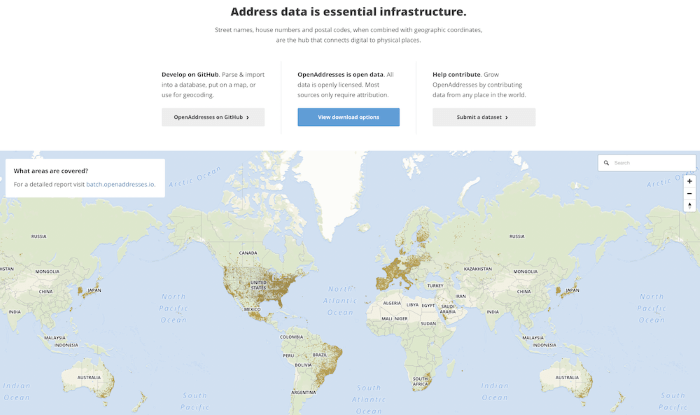
Manual Query via Third-Party Solution
Some third-party tools will let you gather address information by manually typing it into a search field.
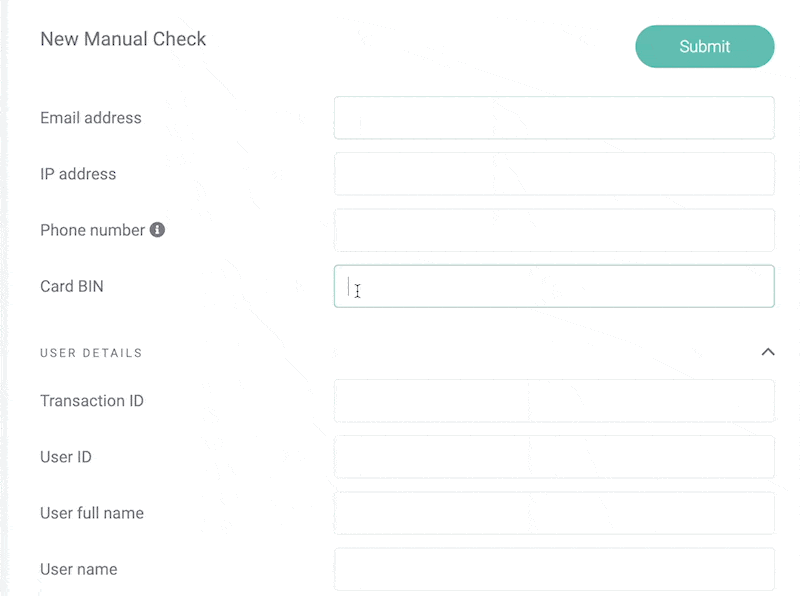
This is helpful if you already have an address but need to learn more about the person who submitted it, thanks to data enrichment.
With such technology, you may get additional information such as:
- what the place looks like in real life
- if it points to a residential, commercial, or industrial area
- whether the address is in the vicinity of the billing or card address
This type of information is ideal for customer segmentation or fraud prevention. In fact, property values in that address could help you figure out who your VIP customers are, and more. In marketing and security, you need to learn as much as possible about your users with as little friction as possible, so a home or shipping address is a great start.
API Integration
Last but not least, you can integrate an address verification solution directly within your own website infrastructure.
Whether it’s to let customers validate their own addresses or to enrich address data behind the scenes, the advantages are the same, as it automates the address validation process, and works at scale.
There are no limits to the volume of addresses you can batch check, often getting results in real-time. This is key for companies who must validate large volumes of user addresses or customer profiles without slowing down the user experience.
Examples of Address Lookup Results
As we’ve established, address lookups can deliver a wide range of results. Here are three examples.
Address Validation
The first type of result – and most common – for an address lookup is to confirm whether the address exists or not, as seen in the screenshot at the top of this article.
You type in a ZIP code (or postcode in the example above), and a website offers you a selection of possible existing addresses.
Google Maps Geolocation
If you need visual confirmation that the address exists, you can check the map or Street View on Google Maps. Some software providers will integrate a snapshot of the area, even letting you navigate the surroundings to get a clearer idea of the kind of neighborhood you’re in – like SEON does in the image below.
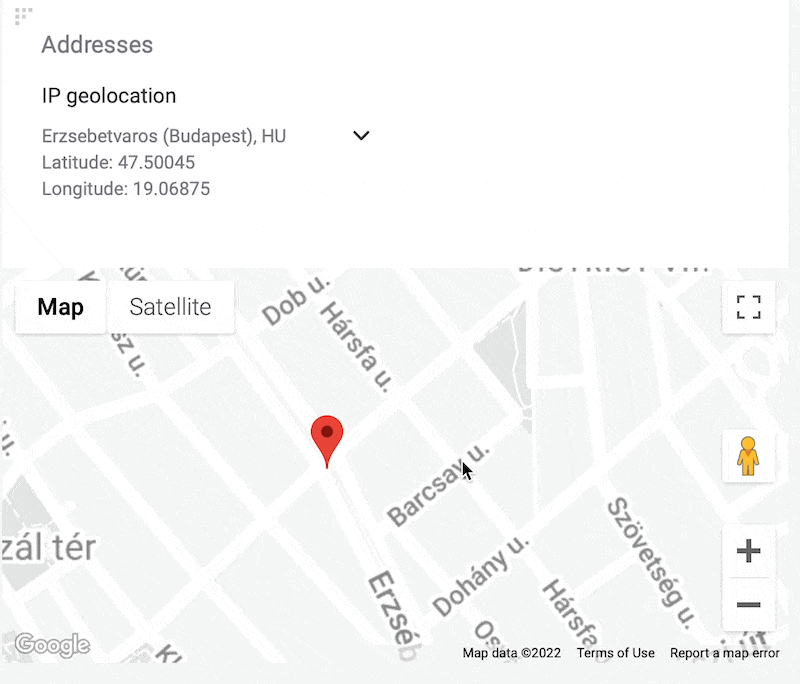
Risk Score
Finally, you may wonder if the address poses a risk to your company or not. This is done by looking at IP addresses, which in turn pinpoint geolocation.
But in the process of IP data enrichment, you also get information about how the person is visiting your website, which lets you learn if they are using a VPN, harmful IP, or suspicious connection.
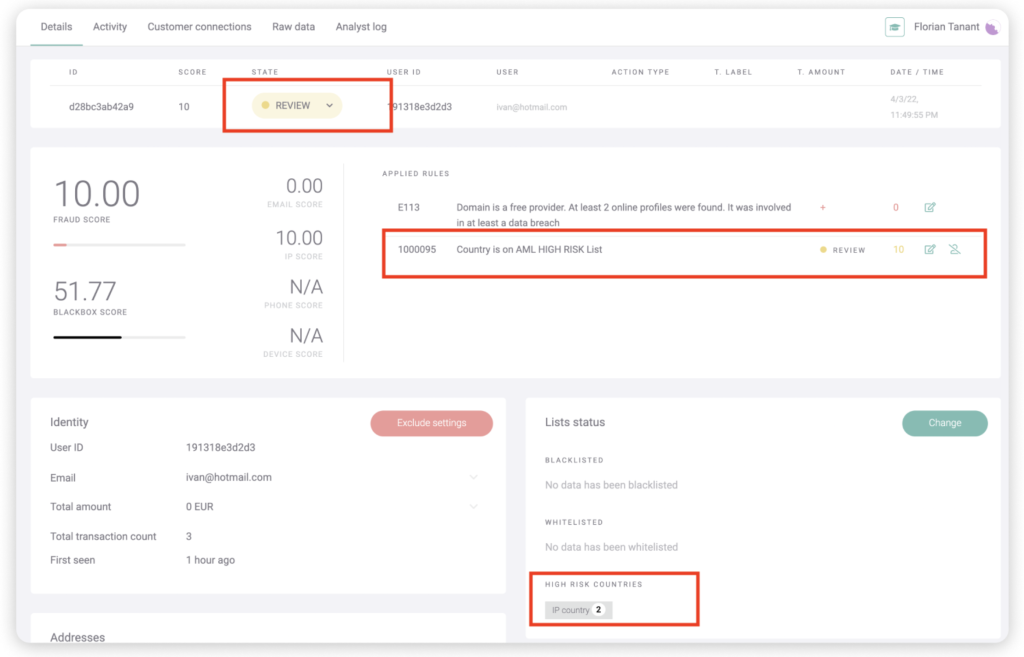
In the example above, we are using the IP and physical address to learn if someone is connecting from a country that has been deemed high risk for money laundering.
You can see that the system added 10 points to a risk score based on other data points. You can then decide to manually review the user data, which helps you remain AML compliant but also works for fraud prevention or customer segmentation. Or, if you risk appetite is very low, you can just block the transaction or even the user.
How SEON Does Address Lookup
As a complete risk management solution, SEON lets you learn as much as possible about your users – with minimum friction. And when it comes to understanding where your users are, our IP lookup tool delivers the following results:
- learn where in the world they are connecting from
- find out if the connection is suspicious or spoofed
- combine the address data with the device, email, and phone information to build a complete customer risk profile
The goal? To give you complete control over the information you leverage to protect your business and your customers, while enabling growth at the same time.
Partner with SEON to reduce fraud rates in your business with real time data enrichment, machine learning, and advanced APIs.
Ask an Expert
FAQ
Address verification, address lookup, and address validation solutions all let you check if an address is valid. It works by consulting official databases and referencing the address you enter into the program.
Address lookups work well for single residential houses. If you are looking at apartment buildings, the information may be harder to get.
Yes, a reverse IP lookup can help you pinpoint the associated geographic location with amazing precision. This is helpful when dealing with ecommerce shipping, for instance.


